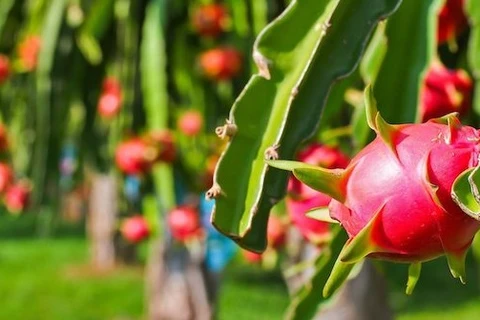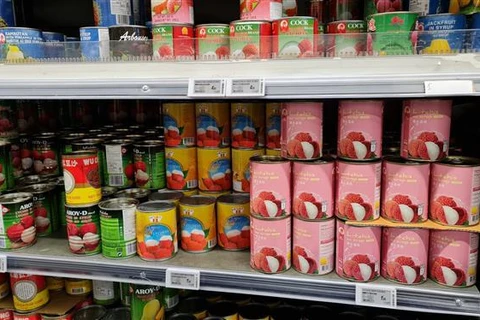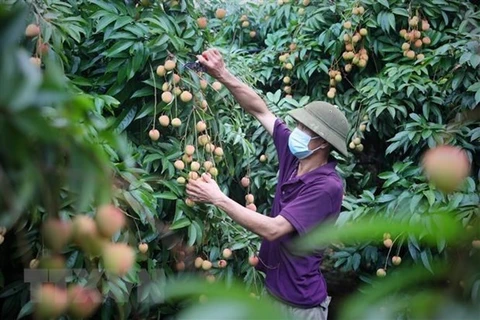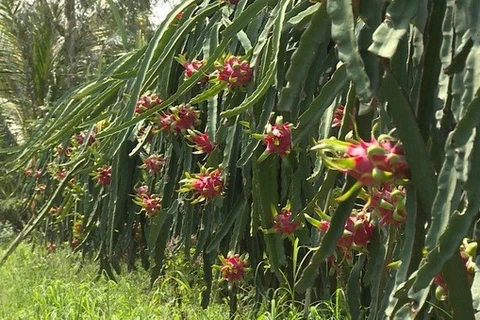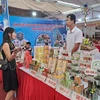Hanoi (VNA) – For Vietnam’s fruit exports to enter high value markets, businesses need to understand new trends in consumption and promote their products in a more professional manner at international trade fairs.
In the first five months of this year, Vietnam’s vegetable and fruit export turnover hit 1.4 billion USD, seeing a decline of 17 percent compared to the same period last year. Shipments to China, one of Vietnam’s largest customers in a variety of sectors, have also plummeted.
A strong shift to high value export markets and improving the quality of products should open new opportunities for Vietnam in the remaining months of 2022, heard a forum focusing on measures to sustainably bolster production and sales of key fruits grown in the southern region hosted by an agency under the Ministry of Agriculture and Rural Development (MARD) on June 8.
Numerous opportunities for Vietnamese fruits
Assessing the situation in the second half of 2022, General Secretary of the Vietnam Fruit and Vegetables Association Dang Phuc Nguyen said that Vietnamese fruits have ample space to enter the Chinese market as China is expected to remove the zero COVID policy by the end of this year or early 2023.
Nevertheless, at present, the policy has thrown a spanner in the works for Vietnam as well as other countries in the region.
In the recent past, commodities shipped to the Chinese market showed signs that they were softening, but not so for banana exports.
In the past five months, China imported 742,000 tonnes of bananas, up 10 percent year on year. Of the figure, shipments from Vietnam accounted for the lion’s share of 43 percent, exceeding the Philippines at 28 percent.
Nguyen explained that banana cultivation areas of China may have reduced due to increasing cost of input materials, land and labour rental fees which prompted the rise in banana imports.
China was forced to resort to the use of varieties that are better resistant to the Panama disease as it triggered a decline in the quality of bananas in the country. The northern neighbour is likely to bolster the imports of the fruit from Vietnam thanks to close geographical proximity.
The official underlined that China is a market of great importance and Vietnamese commodities need to improve quality in order to increase their share in this market. Once the zero COVID policy is lifted, Vietnam is projected to boast a high level of competitiveness against other countries in the region, he added.
For his part, deputy head of the Plant Protection Department under the Ministry of Agriculture and Rural Development Le Van Thiet said that not only bananas, China has allowed passion fruit exports from Vietnam. Meanwhile, negotiation for durian exports is in the final phase as both sides are fine-tuning a protocol stipulating cultivation zones, distributor codes and disease management.
Recently, the pandemic disrupted export activities but opened up new chances at major markets of Vietnamese fruits. Six fruits grown in the Southeast Asian nation already received permission to ship to the US. Talks are underway to enable shipments of Vietnam’s pomelos to two countries.
Improving quality unlocks major markets
Quality and value of Vietnamese fruits must be bolstered to meet technical barriers to become the key to open the doors to high value markets.
Luong Phuoc Vinh, Country Manager Vietnam of Tentamus, said he believed that materials production in Vietnam has been effectively carried out but the country’s farm produce lacks information and orientation, and is quite dependent on the fickle Chinese market.
He added that many markets in Europe hold huge potential if Vietnamese products can fulfil requirements that are not too stringent. It is important to understand conditions set by the markets as European partners stand ready to provide support.
Speaking from experience, Nguyen Dinh Tung, General Director of Vina T&T Group export-import company, suggested the building of a ‘shared house’ to work collaboratively on Vietnamese fruits as a national approach to the new markets. He favours this over attending international trade fairs and setting up booths for separate firms at present.
The chosen companies must effectively honour and affirm Vietnamese fruits as a national brand to international friends, he stressed./.


